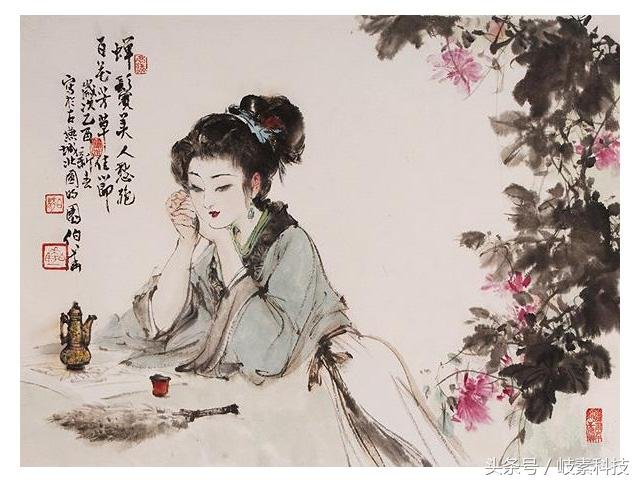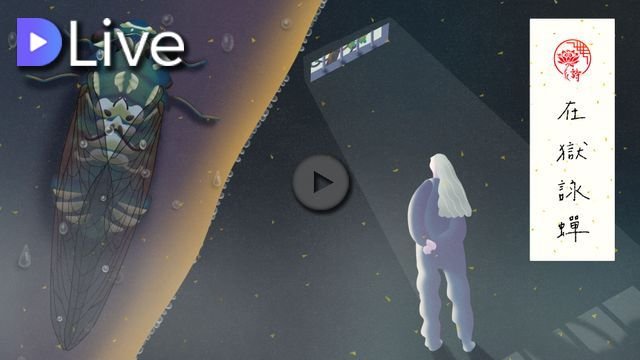Chinese poem - “The Sounds of Cicadas in Prison” by Luo Bingwan (Includes original song and video) | 《在獄詠蟬》- 駱賓王 (內有原創樂曲及影片)
In the northern hemisphere we’re in the middle of summer right now. In summer we often get a lot of rain, , followed by the sounds of cicadas singing. It doesn’t matter whether the sun is high in the sky, hiding quietly behind the drizzle, or if it’s late at night, if we listen carefully we’ll be able to hear them sing. Some think the sound of cicadas is very soothing, while others thinks they’re annoying. Regardless, they’re part of summer.
Cicadas normally appear in summer all through to autumn, and their sounds in autumn brings on another feeling, one of the forthcoming bitter cold and sadness. In the old days, Chinese poets often use cicada sounds to express their emotions and today we want to share with you one of these poems. The poet is Lou Bingwan and he was in prison when the heard the sounds of cicada.
北半球,夏日來臨了!夏日,除了為大地帶來雨水,你還會想到什麼?我會想到蟬,每到盛夏,不論是太陽高照,還是雨後初晴,又或是夜深人靜,只要細心傾聽,我們都會聽到蟬鳴。蟬是夏日的代名詞,蟬叫讓我們有一種特別的感覺,你或感到煩擾,或感到安寧,但在夏日,蟬是必不可缺。
夏蟬的鳴叫一直持繼到秋天,秋蟬的感覺又是如何,那是一種寒冬將來的感覺,讓人感到一點的愁。在中國古代,詩人早已借助蟬鳴,抒發出心中的情愁,今天,不妨讓我們欣賞一首與蟬有關的詩歌,這名詩人賞蟬的地方有點特別,他是在獄中詠蟬,他叫駱賓王。

The Sounds of Cicadas in Prison by Lou Bingwan 駱賓王——在獄詠蟬

The Background 創作背景
This poem was written in AD678 not long after Luo Bingwan was promoted to the position of yi shi, a high ranking official in the palace. Wu Zetian was ruling unofficially as empress consort and empress dowager, yet Luo was not afraid of speaking out and even against Wu. Wu eventually accused him of bribery and threw him into prison. In prison, Luo was full of mixed and complicated emotions. He was resentful for being falsely accused of bribery, scared of not knowing what the future holds, yet full of hope that someone would come to his rescue. It was under these conditions that he wrote “The Sounds of Cicadas in Prison”.
這首詩作於公元678年。當時駱賓王剛剛升為侍御史,但他不僅不奉承武則天,而且「數上書言事」,不平則鳴。最後因上疏論事觸怒武則天,更受到誣陷,以「貪贓」罪名入獄。他在獄中心情複雜, 既因無辜下獄而「怨」,又因命運未知而「懼」,更因希望有人助他脫罪而「盼」。他就是在這樣的心情下寫下名流千古的《在獄詠蟬》。此詩借物抒情、以蟬喻己,讓後世讀者讀來不禁發出由衷的哀嘆。

The Compostion 作品大意
西陸蟬聲唱,南冠客思深。
Xī lù chán shēng chàng , nán guān kè sī shēn
不堪玄鬢影,來對白頭吟。
Bù kān xuán bìn yǐng , lái duì bái tóu yín
露重飛難進,風多響易沉。
Lù zhòng fēi nán jìn , fēng duō xiǎng yì chén
無人信高潔,誰為表予心?
Wú rén xìn gāo jié , shuí wéi biǎo yú xīn ?
The sound of cicadas can be heard singing all through autumn, this is causing me more sorrowness in prison
I cannot bear to see them flapping their black wings, singing Báitóu yín to me as my hair has grown all white
The cicadas can’t fly round in the heavy fog, and their singing is muted by the sound of strong winds
Who will believe my integrity, and who can help me vindicate my innocence and loyalty?
秋天蟬聲不絕,引起身陷囹圄的我的深愁。
我忍受不了那抖動烏黑雙翼的蟬,對鬢髮蒼白的我吟唱「白頭吟」。
秋露濃重,蟬展翅難飛;大風呼嘯,蟬聲被覆蓋。
有誰能相信我的高潔,又有誰能為我表白我的清白與忠誠呢?

The music and sketch 詩與畫
Today we have a song in a minor scale with a deep and sad music to highlight the feeling of Luo. The Mandarin version is performed by @susanlo and the Cantonese version by @tine. A snare goes through the whole song to represent the chirps of the cicada. At the end of the song, we have arranged a duet chorus in both Mandarin and Cantonese to magnify the grievance effect of the song.
這次的音樂走小調的路線,配上低沉的配樂,突顯出作者的心情。國語部份由@susanlo主唱,粵語則是@tine主唱,全曲以snare貫穿整首歌曲扮作蟬叫聲,在歌曲的最後,國語及粵語的合唱,加強了袞怨的效果。

Highlight of the poem 精選詩句

「不堪玄鬢影,來對白頭吟」:
Bù kān xuán bìn yǐng , lái duì bái tóu yín
“Xuán bìn” describes the cicada’s pair of black wing and Luo is using that to represent his own prime years. “Bái tóu yín” is an ancient poem about a poet who was wronged by her husband. On the surface, these two lines in “The Sounds of Cicadas in Prison” describes the contrast of the cicada’s black wings versus Luo’s head full of white hair caused by his feeling of sadness and helplessness. In reality, it represents Luo’s disappointment and indignation towards the country in how they have betrayed his loyalty and allegiance..
「玄鬢」指的是蟬黑色的雙翼,同時比喻正值盛年的作者。「白頭吟」是卓文君寫給變心的司馬相如的詩,詩中「願得一心人,白頭不相離」兩句枯骨銘心,感動了司馬相如,兩人最終重歸於好。《在獄詠蟬》這兩句詩表面寫黑翼蟬對白頭人吟詩的淒哀對比,表達牢獄之冤造成盛年白頭的悲哀與無奈;實際上巧用典故,表達了國家辜負忠心赤膽的忠臣的失望與憤慨。

「露重飛難進,風多響易沉」:
Lù zhòng fēi nán jìn , fēng duō xiǎng yì chén 。
The heavy fog “Lù zhòng” and strong winds “fēng duō” in these two lines describes the weather outside of the prison, an analogy to the political environment. How the cicadas are prevented from flying and their sounds drowned by the winds, describes the difficulty Luo was facing to be righteous before he was sent to prison,
「露重」、「風多」明指獄外的天氣,暗指混濁的政治環境;「飛難進」、「響易沉」明指蟬難以飛翔、鳴聲難以傳播,暗指作者不能在朝廷一展身手、諫言難以被接受。普通的秋景注入了作者主觀的情感,頓時變得無比淒清。亦蟬亦人,景與物皆與作者真摯的情感緊緊相連,實在是感人至深的佳作。

Trivia knowledge 趣味小知識:

In the Tang Dynasty “Chán bìn” (literally meaning cicada, and hair on the temples) was a popular hairstyle where women scooped their hair back to a bun. The sleek black hair on the sides of the temple were like the wings of the cicada, and that’s why Luo used xuán bìn (black hair on the temples) in the poem for the cicada.
「蟬鬢」是盛唐時期流行的鬢式。古代婦女將鬢髮向外梳,髮絲既烏黑又有光澤,有如蟬翼,故名。所以駱賓王在詩中以「玄鬢」借喻蟬。
謝謝大家觀看,我們下回再見!
Production Team 製作團隊
Literature Translation 詩歌解析: @susanlo
Music 音樂: @kona
Art 插圖: @nanosesame
Video 視頻: @aaronli
English Editor 英語編輯: @livinguktaiwan
Chinese Editor 中文編輯: @aaronli

My video is at DLive

I didn't understand much, but the presentation is interesting.
Thank you! Glad you like it :)
大家快來
探監留言吧!係咪探阿嬋🤓🤓
AA 最愛
走開